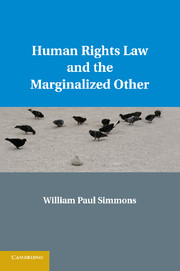Book contents
- Frontmatter
- Brief Contents
- Contents
- Preface
- Introduction
- Part I Deconstruction of Human Rights Law
- Part II Phenomenology of the Saturated Other
- Part III Human Rights of the Marginalized Other
- 5 Learning to Learn from the Voice of the Other
- 6 Self-Ascription by the Marginalized Other in Asylum Law
- 7 Heteronomic Rights and Duties
- Conclusion Working with the Marginalized Other to Deconstruct and Reinvigorate Human Rights Law
- Bibliography
- Index
5 - Learning to Learn from the Voice of the Other
from Part III - Human Rights of the Marginalized Other
Published online by Cambridge University Press: 07 October 2011
- Frontmatter
- Brief Contents
- Contents
- Preface
- Introduction
- Part I Deconstruction of Human Rights Law
- Part II Phenomenology of the Saturated Other
- Part III Human Rights of the Marginalized Other
- 5 Learning to Learn from the Voice of the Other
- 6 Self-Ascription by the Marginalized Other in Asylum Law
- 7 Heteronomic Rights and Duties
- Conclusion Working with the Marginalized Other to Deconstruct and Reinvigorate Human Rights Law
- Bibliography
- Index
Summary
Beasts have no praxis because they have no words.
– Seyla BenhabibPart II developed a phenomenology of the Saturated Other, the marginalized Other who calls the ego to a deeper responsibility because it approaches from outside the system. This responsibility stems from the transcendence, or more accurately, the hyper-presence of the Other. Such a hyper-presence, like Derrida’s undeconstructable justice, calls into question all pretensions of doing justice for the Other, including human rights law. The ego is called to an infinite responsibility to the Other that includes representing the Other at the system’s tribunal. The ego must continuously critique all original and conserving violence, even of the institutions that are set up to serve the Other.
From Dussel’s work, I derived three overlapping modalities of this responsibility. First, the ego is called to a patient listening to the voice of the Other. Second, the Other must be able to self-ascribe his or her identity and to identify his or her own rights. Finally, the ego is called to work with the Other to build the life-project that the Other is unable to complete because the Other is outside the system. This working with the Other for the realization of this life-project requires patient listening, self-ascription, and self-definition of rights so that “the dominated and/or excluded will be constitutive and participant agents in the justice that is also material” (21). In the three chapters of Part III, I employ the insights of theorists Jacques Rancière, Gayatri Spivak, Judith Butler, and others to explore how human rights law can better respond to the call of the marginalized Other through each of these three interrelated modalities.
- Type
- Chapter
- Information
- Human Rights Law and the Marginalized Other , pp. 129 - 159Publisher: Cambridge University PressPrint publication year: 2011



